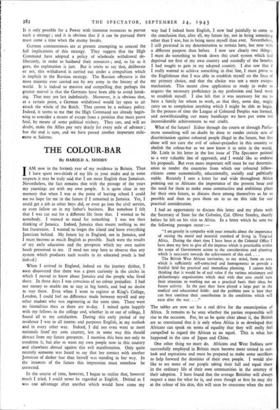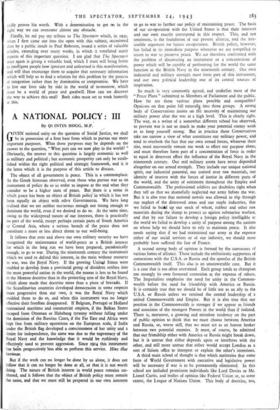THE COLOUR-BAR
By HAROLD A. MOODY IAM now in the fortieth year of my residence in Britain. Thus I have spent two-thirds of my life in your midst and in some respects it may be truly said that I am more English than Jamaican. Nevertheless, the fact remains that with the passage of the years my yearnings are with my own people. It is quite clear in my memory that when I was at the point of leaving school I could see no hope for me in the future if I remained in Jamaica. Yes, I could get a job as other boys did, or even go into the civil service, or even follow on in my father's business. But somehow I felt that I was cut out for a different life from that. I wanted to be somebody. I wanted to stand for something. I was not then. thinking of Jamaica. Indeed, Jamaica then meant nothing to me. but frustration. I wanted to forget the island and leave everything Jamaican behind. My future lay in England, not in Jamaica, and I must become as much English as possible. Such were the results of my early education and the prospects which my own native heath presented to me. (I need not stop here to observe that any system which produces such results in its educated youth is bad indeed.)
When I arrived in England, indeed on the journey thither, I soon discovered that there was a great curiosity in the circles in which I moved to know about Jamaica and the people who lived there. In those days I was conscious of no colour prejudice. I had not money to enable me to stay at big hotels, and had no desire to stay there. Even when I went to register at King's College, London, I could feel no difference made between myself and any other student who was registering at the same time. There were no formalities then as there are to-day. I mixed quite happily with my fellows in the college and, whether in or out of college, I found all to my satisfaction. During this early period of my residence I was to all intents and purposes English, in my outlook and in every other way. Indeed, I did not even want to meet nationals frorri my own country, lest in some way this should detract from my future prospects. I mention this here not only to condemn it, but also to warn my own people now in this country and elsewhere abroad against this evil manifestation. Only quite recently someone was heard to say that her contact with another Jamaican of darker hue than herself was standing in her way. In the interests of the future this impression must somehow be corrected.
In the course of time, however, I began to realise that, however much I tried, I could never be regarded as English. Denied as I was one advantage after another which would have come my
way had I indeed been English, I now had painfully to come to the conclusion that, after all, my future lay, not in being something other than I was, but in being more myself than ever. Nevertheless, I still persisted in my determination to remain here, but now with a different purpose than before. I now saw clearly two things: I must do something to break down this cruel system which had deprived me first of my own country and secondly of the benefits I had sought to gain in my adopted country. I also saw that if I really wanted to achieve something in that line, I must prove to the Englishman that I was able 'to establish myself on the lines of my primary choice, and that the choice was not a mere escape- mechanism. This meant close application to study in order to acquire the necessary proficiency in my profession and hard work to establish myself. I also felt that it was necessary for me to have a family for whom to work, so that they, some day, might carry on to completion anything which I might be able to begin. In the process of time the League of Coloured Peoples was formed, and notwithstanding our many handicaps we have put some not inconsiderable achievements to our credit.
What of the future? Either through the courts or through Parlia- ment something will no doubt be done to render certain acts of discrimination against coloured people illegal in the future, but this alone will not cure the evil of colour-prejudice in this country or abolish the colour-bar as we, now know it to exist in the world. Mr. Little in his letter in the last issue of The Spectator pointed to a very, valuable line of approach, and I would like to endorse his proposals. But even more important' still must be our determin- ation to render the countries from which our coloured fellow- citizens come economically, educationally, socially and politically stable. Recently I sent a letter far and wide throughout Africa pointing out to Africans the importance of the present hour and the need for them to make some constructive and ambitious plans for their own future, to discuss these among themselves as far as possible and then to pass them on to us on this side for our practical consideration.
I had an opportunity to discuss this letter and my plans with the Secretary of State for the Colonies, Col. Oliver Stanley, shortly before he left on his visit to Africa. In a letter which he sent me the following passages occur : -
" I am greatly in sympathy with your remarks about the importance of raising the moral and material standard of living in Tropical Africa. During the short time I have been at the Colonial Office I have done my best to give all the impetus which is practicable within the scope of Government action to the consideration and planning which is necessary towards the achievement of this end. . . .
The British West African territories, to my mind, form an area which is sufficiently self-contained and homogeneous to provide a fruitful field for practical and immediate planning. I cannot help thinking that it would be of real value if the various missionary and philanthropic organisations which deal with that area could turn their attention to working out on a practical basis their ideas for future activity. In the past they have played a large part in the medical and educational fields: and the problem now is how they can best continue their contribution in the conditions which will exist after the war. . . ."
The tables are now set for a real drive for the emancipation of Africa. It remains to be seen whether the parties responsible will rise to the occasion. For, let us be quite clear about it, the British are so constituted that it is only when Africa is so developed that Africans can speak on terms of equality that they will really feel compelled to regard the African as an equal. This is what has happened in the case of Japan and China.
One other thing we must do. Africans and West Indians now successfully employed in Britain must become more united in out- look and aspirations and must be prepared to make some sacrifices to help forward the destinies of their own people. I would also like to see more of our people taking their full and equal share in the ordinary life of their own communities in the country of their adoption. I have found that the average Britisher will always respect a man for what he is, and even though at first he may shy at the colour of his skin, this will soon be overcome when the man really proves his worth. With a determination to get on in the right way we can overcome almost any obstacle.
Finally, let me pay my tribute to The Spectator which, in 1931, when I first came out into the open with this subject, occasioned then by a public insult to Paul Robeson, issued a series of valuable articles, extending over many weeks, in which it ventilated many aspects of this important question.. I am glad that The Spectator once again is giving a valuable lead, which I trust will bring home to intelligent people how ignorant and unlearned is this manifestation, and will thus encourage them to acquire that necessary information which will help us to find a solution for this problem by the process of integration rather than by domination or compromise. We have to live our lives side by side in the world of • to-morrow, which must be a world of peace and goodwill. How can we discover the way to achieve this end? Both sides must set to work honestly at this.



























 Previous page
Previous page